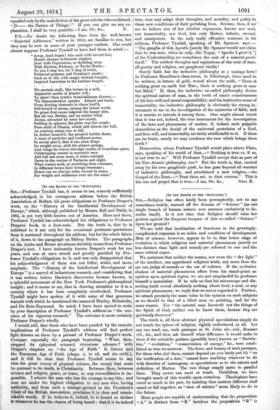[TO THE EDITOR OF THE "SPECTATOBA
Szn,--Professor Tyndall has, it seems to me, scarcely sufficiently acknowledged, in his courageous address before the British Association at Belfast, hii3 great obligations to Professor Draper's work, on the "History of the Intellectual Development of Europe," which, although published by Messrs. Bell and Daldy in 1864, is yet very little known out of America. Here and there, Professor Tyndall has acknowledged his obligations to Professor Drapers' book, in a foot-note. But the truth is, that he is indebted to it not only for the occasional pertinent quotations from it scattered throughout his address, but for the whole fabric of it, down to the paragraph on Bishop Butler. The paragraphs on the Arabs and Bruno are almost slavishly recast from Professor Draper's text. I have intimately known Draper's work for ten years, and was at once struck and greatly gratified by Pro- fessor Tyndall's obligations to it, and was only disappointed that his acknowledgment " of them was not fuller, wider, and more emphatic. The "History of the Intellectual Development of Europe" is a marvel of industrious research, and considering that it was written before Darwin's discoveries became known, is a splendid monument of the New York Professor's philosophical insight ; and it seems to me, that in drawing attention to it in a country where it has been completely overlooked, Professor Tyndall might have spoken of it with some of that generous warmth with which he mentioned the names of Huxley, Helmholtz, and Du Bois-Raymond. So much I have been moved to write by your description of Professor Tyndall's address as "the out- come of his vigorous research." The outcome is most certainly Professor Draper's wholly.
I would add, that those who have been puzzled by the esoteric implications of Professor Tyndall's address will find perfect light thrown on them by a perusal of Professor Draper's work. Compare especially the paragraph beginning, "What, then, stopped its (physical science) victorious advance ? with Draper's chapters on "the Age of Faith" in Greece and the European Age of Faith (chaps. x. to xii. and xiv.-xviii.), and it will be clear that Professor Tyndall means to say that the great enemy of physical science, the enemy that must be pursued to its death, is Christianity. Between them, between science and religion, peace, or truce, or any reconciliation is im- possible. I admire the man who has the courage to say this ; and men are under the highest obligation to any man who, having authority, and from such a vantage-ground as the President's Chair of the British Association, proclaims it in clear and uiamis- takable words. If he believes it, indeed, he is bound to declare it whenever he has the chance of being heard ; that if it be indeed true, men may adapt their thoughts, and "morality, and polity these new conditions of their perishing lives. Science, then, if we are to believe one of her chiefest exponents, knows nor soul, nor immortality, nor God, but only Matter, infinite, eternal, and omnipotent. In the only really offensive sentence in his address, Professor Tyndall, spea king of Mr. Spencer, says :— "The ganglia of this Apostle [surely Mr. Spencer would not claim that he was sent, when he only, like Topsy, "specks I grow'cl,"] of the Understanding are sometimes the seat of a nascent poetic thrill." The noblest thoughts and aspirations of the soul of man, all poetry and religion, are ganglionic thrills !
Surely faith has the inductive philosophy at a vantage here! In Professor Hamilton's class-room, in Edinburgh, there used to be written, in letters of gold, round about the walls, "There is nothing great on earth but Man ; there is nothing great in man but Mind." If, then, the inductive so-called philosophy denies the spiritual nature of man, in the teeth of man's consciousness of his free-will and moral responsibility, and his instinctive sense of immortality, the inductive philosophy is obviously the wrong in- strument to use in the investigation of the mysteries of faith; and it is unwise to intrude it among them. One might almost retort that it was not, indeed, the true instrument for the investigation of the laws and phenomena of matter, if. indeed, such palpable absurdities as the denial of the universal postulates of a God, and free-will, and immortality are fairly attributable to it. If these are its fruits, surely we may condemn the tree which brings them forth ?
Democritus, whom Professor Tyndall would place above Plato, says, speaking of his world of dust,—" Nothing is true or, if so, is not true to us." Will Professor Tyndall accept that as part of his No-Atomic philosophy, too ? But the truth is, that, carried away by his own ganglionic gush, he has gone beyond all warrant of inductive philosophy, and proclaimed a new religion,—the Gospel of the Dust,—" Dust thou art, to dust returns." This is
the one sad gospel that is true.—I am, Sir, &c., GEO. B.






























 Previous page
Previous page